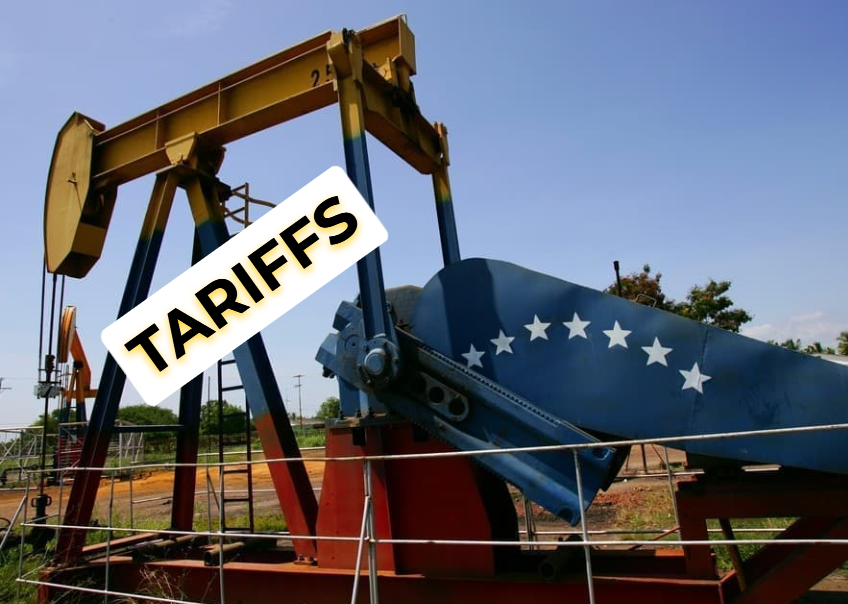
- With the 25% tariff on countries purchasing oil from Venezuela, the global oil market could experience ripple effects as countries like China are likely to bear the brunt of the tariff.
- A significant increase in oil prices could lead to a rise in global oil prices, especially if alternative suppliers like Saudi Arabia or the U.S. cannot meet the demand shift in the short term.
- The decision to levy this tariff is a clear reflection of the U.S. foreign policy toward Latin America, which has traditionally emphasized pressure on countries diverging from U.S. interests.
On March 24, 2025, U.S. President Donald Trump announced a 25% tariff on any country buying oil or gas from Venezuela, effective April 2, 2025. This significant move carries wide-ranging implications for international trade, U.S. foreign policy, economic impacts, and diplomatic relations with countries that continue to engage in business with Venezuela.
Venezuela is one of the largest oil producers in the world despite years of political instability and economic mismanagement. However, the nation has been struggling due to sanctions imposed by the U.S. and other countries, severely limiting its ability to export oil. In 2024, Venezuela produced approximately 700,000 barrels of oil daily, down from its peak of 3 million barrels in the 1990s. This sharp decline in production has led to Venezuela’s oil exports being heavily reliant on a small group of buyers, primarily China, Russia, and some countries in the Middle East.
International Trade and Economic Impact
With the new 25% tariff on countries purchasing oil from Venezuela, the global oil market could experience ripple effects. Countries that continue to engage with Venezuela, such as China, are likely to bear the brunt of the tariff, as they are major buyers of Venezuelan crude oil. In 2024, China accounted for nearly 50% of Venezuela’s oil exports, making it the single largest importer. A significant increase in oil prices could lead to a rise in global oil prices, especially if alternative suppliers like Saudi Arabia or the U.S. cannot meet the demand shift in the short term.
For countries in Latin America that depend on Venezuelan oil, such as Cuba and some Caribbean nations, the tariff poses additional risks to their economies. These countries could face higher oil costs and reduced supplies, leading to economic instability. These regions have been receiving discounted oil from Venezuela for years, and the imposition of the tariff disrupts a long-standing trade arrangement.
U.S. Foreign Policy and Diplomatic Relations
The 25% tariff is not just an economic measure but also a geopolitical tool to punish Venezuela’s government for its perceived hostility towards the U.S. over the years. Venezuela’s President Nicolás Maduro has been a vocal critic of U.S. foreign policy, and his government has been accused of human rights violations, authoritarian rule, and connections to various insurgent groups. By imposing a tariff, Trump aims to exert economic pressure on Venezuela, possibly attempting to destabilize Maduro’s regime.
The decision to levy this tariff is also a clear reflection of the broader U.S. foreign policy approach toward Latin America, which has traditionally emphasized pressure on countries diverging from U.S. interests. Countries like Iran and Russia, which have supported Venezuela in recent years, are likely to view this tariff as a provocation. This could lead to further diplomatic tensions between the U.S. and these countries, especially since both have strategic interests in Venezuela’s oil reserves.
Furthermore, countries in Europe and Latin America that maintain relatively neutral stances or have business ties with Venezuela could feel caught in the middle of the growing tensions between the U.S. and Venezuela. While the U.S. seeks to isolate Venezuela economically, countries like Spain, Italy, and Turkey may find themselves having to choose between economic relations with Venezuela or avoiding sanctions from the U.S.
Broader Geopolitical Context and Future Outlook
Introducing tariffs against Venezuela could also have a lasting impact on the broader geopolitical context, particularly in the energy sector. Venezuela’s oil reserves are among the largest in the world, and its political stability is crucial for global oil markets. Should the U.S. succeed in further isolating Venezuela from the worldwide economy, there could be shifts in the global energy market, as oil-rich nations like Saudi Arabia and Russia will likely capitalize on the gap in the international oil supply.
However, the shift could also push Venezuela closer to other countries skeptical of U.S. dominance, such as China, Russia, and Iran, further strengthening ties with these nations and contributing to a multipolar world order. Additionally, as countries attempt to circumvent U.S. tariffs, new trade routes or alternative trading systems may emerge, challenging the traditional U.S.-led global trade order.
Conclusion
The 25% tariff on Venezuelan oil represents more than just an economic policy. It is a tool for U.S. foreign policy and a signal to the global community about the U.S.’s stance on authoritarian regimes. It is likely to have far-reaching impacts on global oil markets, trade relationships, and diplomatic ties, with a particular focus on countries in Latin America, Asia, and Europe. As the geopolitical dynamics surrounding Venezuela continue to evolve, the long-term effects of these tariffs will shape the future of U.S.- Venezuelan relations and the broader international trade landscape.
Sakshi Yadav is pursuing a Master’s Degree in International Studies from Christ University, Bangalore. Her research areas include International Political Economy, South Asia, South Pacific and U.S. Foreign Policy. Views expressed are the author’s own.
